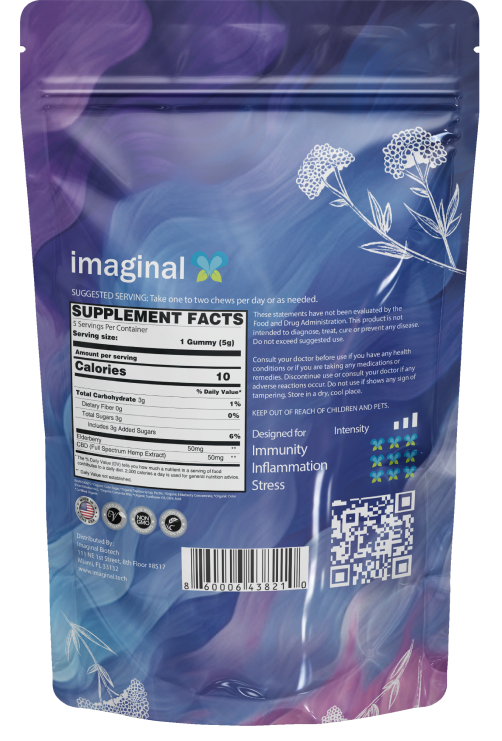According to the National Institute of Neurological Disorders and Stroke, Restless Legs Syndrome (RLS) affects about 7-10 percent of the U.S. population.
It is a neurological sensory disorder that causes exhaustion and daytime sleepiness. RLS affects concentration, mood, school and workplace performance, and personal relationships.
Because the possible causes of Restless Legs cover many conditions — everything from low dopamine to iron deficiency to varicose veins — remedies are hard to come by.
Lately, several studies and reports suggest CBD might help ease the legs' uncontrollable spasms and tingling feelings.
Let's dive deep into the available research.
Table of Contents
- What Is Restless Legs Syndrome (RLS)?
- Causes Of Restless Legs
- What Are The Most Common RLS Symptoms
- 1. Mild To Severe Discomfort In Legs
- 2. Irresistible Urge To Move Legs
- 3. Sleep Disruption
- 4. Daytime Sleepiness
- 5. Reduction In Work Performance
- Traditional Treatment For Restless Legs
- Can CBD Help With Restless Legs?
- 1. CBD Reduces Pain
- 2. CBD Regulates Sleep
- 3. CBD Relieves Stress
- 4. CBD Reduces Inflammation
- 5. CBD Relieves Muscle Spasms and Cramps
- What Type Of CBD Works For Restless Legs
- Recommended Dosage
- How Imaginal Elderberry Gummies Can Help With RLS
- Final Thoughts
What Is Restless Legs Syndrome (RLS)?
Also known as Willis-Ekbom disease, Restless Legs Syndrome is a neurological disorder that causes an overwhelming, irresistible urge to move the legs.
It is categorized as a sleep disorder because the symptoms commonly occur in the evening and get severe as the night approaches when the person is resting or attempting to sleep.
The occurrence of Restless Legs Syndrome increases with age, and almost all studies show that RLS is more predominant in women than in men after age 30.

People with RLS report suffering from a lack of concentration and impaired memory, failing to do daily tasks. It can reduce 20 percent of work productivity and trigger depression and anxiety if left untreated.
Research shows that around 80 to 90 percent of people suffering from RLS also experience Periodic Limb Movement Disorders. PLMD is involuntary leg jerking and twitching during sleep occurring every 15 to 40 seconds.
Causes Of Restless Legs
The exact cause of RLS is still a mystery. Some speculated causes of RLS are:
1. Genetics
Studies suggest that genetics plays a vital role in Restless Legs Syndrome. In 92 percent of cases, this genetic syndrome is passed down to children.
Such patients develop symptoms in their early 40s.
2. Chronic Diseases
The symptoms of Restless Legs Syndrome are associated with certain long-term medical conditions, like Parkinson's disease, iron deficiency, renal disease or kidney failure, peripheral neuropathy, and diabetes.
3. Medications
RLS symptoms worsen with antidepressants, antipsychotics, antinausea medication, and antihistamines.
4. Pregnancy
Twenty percent of all pregnant women experience Restless Legs during the last trimester.
5. Unhealthy Lifestyle
Unhealthy lifestyle choices can trigger RLS symptoms. It includes the consumption of tobacco, alcohol, and caffeine.
Also, sleep disorders like Apnea or general lack of sleep can worsen RLS symptoms.
What Are The Most Common RLS Symptoms
A Korean study surveying children and adolescents with RLS and ADHD found the following symptoms for RLS

1. Mild To Severe Discomfort In Legs
The most prominent symptom of RLS is uncomfortable sensations in the legs or feet. It is often described as tugging, creeping, pulling, itching, crawling, throbbing, gnawing, or burning.
These sensations are usually triggered while resting, especially near bedtime.
2. Irresistible Urge To Move Legs
The mild to severe discomfort in the lower limbs is associated with an uncontrollable urge to move the legs and feet, especially when relaxing, such as lying down to sleep or sitting for long.
3. Sleep Disruption
The sensations in the legs range in severity from unpleasant to irritating to painful. It results in burdensome disruption of sleep.
4. Daytime Sleepiness
The RLS symptoms usually go away around early morning. But it causes daytime sleepiness and lethargy.
5. Reduction In Work Performance
Sleep disruption causes behavior problems like moodiness, irritability, hyperactivity, and difficulty concentrating.
Traditional Treatment For Restless Legs
Since the root cause of RLS isn't actually known, there are various treatment methods and lifestyle changes recommended to alleviate the symptoms.
The treatment protocol usually consists of :
- Ruling out potential causes like consumption of alcohol, tobacco, and caffeine.
- Avoiding antihistamines, antipsychotics, antinausea, tricyclic antidepressants, lithium, and selective serotonin reuptake inhibitors (SSRIs).
- Treating chronic diseases.
- Adopting good sleep habits.
- Taking iron and vitamin supplements.
- Doing regular exercises, yoga, and stretching.
- Taking prescription medications like dopaminergic drugs.
Along with all these changes, you can also experiment with CBD.
Can CBD Help With Restless Legs?
CBD, found in cannabis plants, interacts with the body's Endocannabinoid System (ECS). ECS regulates critical physiological processes such as sleep, appetite, mood, and pain response.
There have been credible reports of complete remission of RLS symptoms after using CBD.
Although the efficacy of CBD for restless legs syndrome is still unknown, the pain-blocking effects of CBD might be the reason.
There are many ways CBD interacts with the brain to relieve symptoms associated with RLS:
1. CBD Reduces Pain
According to a review article, CBD relieves chronic pain. It interacts with both opioid receptors and serotonin receptors. You can take CBD for restless legs and test if you experience relief in symptoms.
2. CBD Regulates Sleep
CBD activates melatonin receptors that are responsible for regulating sleep patterns. CBD helps reduce sleep disorders like insomnia which is often associated with RLS.
3. CBD Relieves Stress
Anxiety and stress are big triggers for restless legs.
CBD helps reduce anxiety by positive effects on dopamine production. This ca help reduce RLS symptoms.
4. CBD Reduces Inflammation
The anti-inflammatory properties of CBD can help to reduce the low-grade inflammation caused by chronic health problems that trigger or worsen RLS.
5. CBD Relieves Muscle Spasms and Cramps
CBD possesses muscle relaxant properties. It helps relieve muscle spasms and cramps associated with RLS.
What Type Of CBD Works For Restless Legs
For restless legs, taking full-spectrum CBD (containing all cannabinoids, including THC) is more effective than broad-spectrum or isolated CBD.
A review published in the British Journal of Pharmacology suggests that taking CBD and THC together — along with terpenoids or terpenes, organic compounds found in the cannabis plant — is more effective.
The most common types of CBD for restless legs symptoms are:
- CBD Oil (oral and sublingual)
- CBD Cream (topical)
- CBD Capsules (edible)
- CBD Flowers And Resins (inhaled)
Recommended Dosage
With CBD, there is hardly any risk of overdosing, but there is no optimal dosage either.
If you want to use CBD for restless legs, you should start with a low dose. The dose is gradually increased and adjusted according to the intensity of pain and the body's response.
Always ask your doctor or a pharmacist for advice before starting a course of treatment.
How Imaginal Elderberry Gummies Can Help With RLS
Our Elderberry Gummies is a delicious combination of 50 mg elderberry and 50 mg premium, full-spectrum CBD.
Our customers have reported better sleep, lower anxiety, and relief in pain, stress, and muscle spasms after using these gummies.
All of these outcomes could help alleviate RLS symptoms.
One or two gummies daily could help strengthen the immune and blood circulatory system, resulting in remission of RLS symptoms to a large extent.
Our gummies contain full-spectrum CBD having 2.5mg/g of THC, flavonoids, and terpenoids that work together to create a strong synergistic effect to comfort this neurological disorder.
Final Thoughts
No study focuses on CBD for Restless Legs Syndrome, but many CBD studies show that it can relieve RLS symptoms.
CBD helps relax the muscles, improve sleep patterns, and ease the pain. It also helps reduce stress, and low-grade inflammation, worsening RLS symptoms.
Again, if you are suffering from RLS, please contact your doctor before self-medicating.
(This post is written by Zara A. Khan, a freelance writer specializing in the CBD niche)





